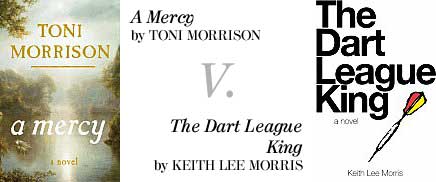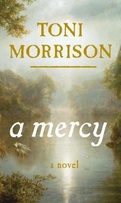
- This is Round 1, Match 7 of the JOHN UPDIKE REGIONAL
- March 17, 2009
- Next Match
- Previous Match
The Tournament of Books is an annual battle royale between 16 of the best novels published in the previous year.
A new match is played here each weekday in March.
All titles 30% off at Powells.com
The Rooster on Facebook, and on Twitter
Previous years: 2008, 2007, 2006, 2005
Contact the Tournament staff:
talk@themorningnews.org

judged by Jonathan Eig
The Dart League King unfolds in a single day, as five characters come together on dart-league night at the 321 Club in Garnet Lake, Idaho. Will Russell Harmon find love or a bullet in the skull? Will the case of a missing college girl be solved? Will the narcotics agent get his man? That’s the nut of it.
Morris can be heavy-handed, as on the book’s second page, when his protagonist snorts four lines of coke “spread out on the glass of his framed high-school diploma.” When he tells us two pages later that said protagonist bought his darts on credit, I’m not buying it. Who’s going to sell a guy darts on credit? I don’t mean to quibble. My point is that Morris sometimes sells his characters a little too hard, and in so doing leaves them soft around the edges—especially his women.
That said, I loved the book. It grabbed me by my shirt front and pulled me close. Morris writes gorgeous, muscular sentences. He knows how to build suspense. He kept me entertained and guessing every step of the way. By the end, you would have needed a crowbar to separate me from this book.
I had an entirely different experience with A Mercy. Truth told, I fell asleep a couple of times mid-page. Once upon a time, I was a huge fan of Toni Morrison, but I grew a little tired of her shtick after Beloved and hadn’t read any of her books since. If the Rooster hadn’t knocked at my door, I would have skipped this one, too.
Morrison makes me dizzy. I read passages knowing that I’m not supposed to understand them, that I might understand them later, or not. Scenes come and go like drunken brainstorms, in random order and in ways too blurry to do any good. “Don’t be afraid,” an unidentified narrator tells us by way of introduction in this book. “You can think what I tell you a confession, if you like, but one full of curiosities familiar only in dreams and during those moments when a dog’s profile plays in the steam of a kettle.”
Swell.
And yet somehow, for me, somewhere along the way, it began to sink in. The landscape opened up. The characters popped to life. A Mercy tells of four abandoned women, one white, one Native American, two black, all enslaved, at least in some sense of the word. It’s the 17th century and slavery is new. We usually read about slavery after the scars have formed, but in this story the institution is just taking shape, the relationships untested, the morals are ambiguous, the possibilities are endless—which of course makes it all the more profoundly tragic.
Then there’s the writing, which took my breath away at times. “Walking in the warm night air,” Morrison writes, “he went as far as possible, until the alehouse lights were gem stones fighting darkness and the voices of carousing men were lost to the silk-rustle of surf. The sky had forgotten completely its morning fire and was tricked out in cool stars on a canvas smooth and dark as Regina’s hide. He gazed at the occasional dapple of starlight on the water, then bent down and placed his hands in it. Sand moved under his palms; infant waves died above his wrists, soaking the cuffs of his sleeves. By and by the detritus of the day washed off….”
Morrison packs a lot of story, a lot of beauty, a lot of tension, and a lot of pain into 167 pages. Even when I didn’t quite understand it, this book rattled my bones and left me shaking long after I finished it. So strange. So beautiful. So sad.
So there you go, Toni Morrison. Put another trophy on the shelf next to your Nobel. You’ve beaten the Dart League King.
Today’s WINNER
A Mercy by Toni Morrison

About the Judge
From the Booth
| The women have it all over the men this year in the art of putting the perfect word next to a bunch of other words. | Kevin | John | I want a recount. Failing that, I’m praying for a zombie resurrection. |
» Read Kevin Guilfoile & John Warner’s commentary on the match and leave a comment of your own «
The Standings
View the Brackets [PDF]
• Finals •
City of Refuge3 v. A Mercy1
judged by all judges + Amanda Hesser
• Round 1 •
26661 v. Steer Toward Rock4
judged by Brockman
Netherland2 v. A Partisan’s Daughter3
judged by Kate Schlegel
The White Tiger1 v. Harry, Revised4
judged by Jonah Lehrer
Unaccustomed Earth2 v. City of Refuge3
judged by Mary Roach
Shadow Country1 v. The Disreputable History of Frankie Landau-Banks4
judged by Anthony Doerr
The Lazarus Project2 v. The Northern Clemency3
judged by Monica Ali
A Mercy1 v. The Dart League King4
judged by Jonathan Eig
Home2 v. My Revolutions3
judged by Witold Riedel
• Round 2 •
26661 v. A Partisan’s Daughter3
judged by Maud Newton
Harry, Revised4 v. City of Refuge3
judged by David Rees
Shadow Country1 v. The Lazarus Project2
judged by C. Max Magee
A Mercy1 v. My Revolutions3
judged by John Hodgman
• Semifinals •
26661 v. City of Refuge3
judged by Liz Entman
Shadow Country1 v. A Mercy1
judged by Junot Díaz
• Zombie Round •
City of Refuge3 v. The Disreputable History of Frankie Landau-Banks4
judged by Rosecrans Baldwin

